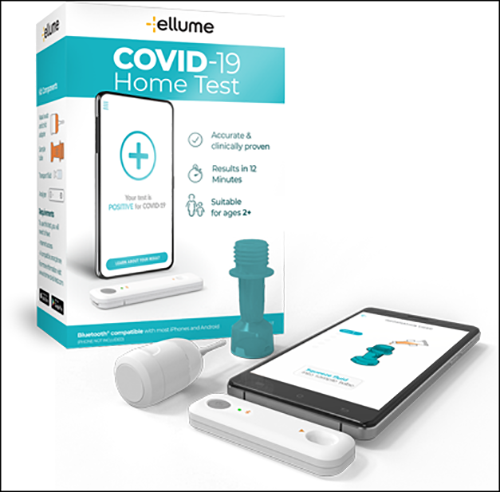Popular Science Review Finds Seven At-Home COVID-19 Antigen Tests ‘Easy to Use’ and ‘An Important Tool to Slow Spread of the Coronavirus’
Though clinical laboratory RT-PCR tests remain the ‘gold standard’ when diagnosing COVID-19, at-home antigen tests offer convenience and quick test results. But are they accurate?
Less than six months after the US Food and Drug Administration (FDA) issued the first ever emergency use authorization (EUA) for an over-the-counter SARS-CoV-2 diagnostic test to Ellume for its COVID-19 at-home antigen test, the number of do-it-yourself at-home tests available to consumers has grown large enough for Popular Science to publish a review of available consumer COVID-19 testing kits.
Clinical laboratory and pathologists generally acknowledge that RT-Polymerase Chain Reaction (RT-PCR) tests remain the preferred method for detecting COVID-19 disease. However, according to Popular Science, rapid at-home antigen tests that accurately identify people carrying larger loads of the virus are becoming important tools in the fight against spread of the coronavirus.
In “We Vetted Popular At-Home COVID-19 Tests. Here’s What We Learned: Everything you need to know about the growing number of at-home testing options for COVID,” Popular Science evaluated the ease-of-use and effectiveness of the following tests:
- Ellume COVID-19 Home Test: A nasal swab test that delivers results in 15 minutes. Sold online and at CVS Pharmacy for $38.99.
- DxTerity SARS-CoV-2: This saliva-based collection kit is available on Amazon and at Walmart for $110. Specimens must be sent via FedEx on the same day as collection. Results are available within 24 to 72 hours of the sample being received by the PCR testing lab.
- Cue COVID-19 Test for Home and Over the Counter Use: This is the first molecular diagnostic test available for at-home use without a prescription to receive FDA emergency use authorization. The nasal swab test provides results in about 20 minutes on a user’s mobile device. The test currently is only being distributed by the Department of Defense (DoD) and Department of Health and Human Services (HHS). Retail pricing has not yet been released.
- Lucira Check It COVID-19 Test Kit: Billed as offering “PCR quality molecular accuracy,” this nasal swab test costs $55 and provides results in 30 minutes or less.
- Abbott BinaxNOW Antigen Self-Test. Results within 15 minutes and available for $23.99 at major pharmacies. Each box includes two nasal swab tests, with the second test taken within 36 hours of the first.
- Pixel COVID-19 At-Home Collection Kit: This nasal-swab-based mail-in collection kit is available online for $119. Results delivered within 24 to 48 hours of the sample being received by Labcorp.
- Quest Direct COVID-19 Active Infection: This $119 nasal swab kit requires an additional $9.30 PNW Health physician fee. Results are expected within 24 to 48 hours of the sample being received by Quest Diagnostics.
Many of the newest at-home tests not only have users collect their own swab or saliva samples, but some also provide results in less than an hour, which can be sent to the user’s smartphone. Conversely, home-based collection kits that are returned to clinical laboratories for testing can take 48 hours or longer for shipping and processing.

Are At-Home COVID-19 Tests a Good Idea?
“The more we can do simple, regular, at-home testing, the less we need it,” Mara Aspinall, Professor, College of Health Solutions at Arizona State University, told Popular Science. “It’ll become a habit, as easy as brushing your teeth,” she added.
But in “Pathologists Urge Caution on At-Home COVID Test Kits,” MedPage Today, reporting on the College of American Pathologists (CAP) March 11 virtual media briefing, pointed out downsides to at-home COVID-19 tests.
Among the issues cited were the potential for inadequate samples and improper handling to cause inaccurate results, as well as uncertainty whether at-home antigen tests will pick up on COVID-19 variants.
At-home tests also are less likely to be covered by insurance, MedPage Today reported.

How Do the Tests’ Accuracy Compare?
The Quest Direct and LabCorp Pixel tests—both of which are sent to company labs for PCR testing—scored highest on the two main statistical measures of performance sensitivity (positive percent agreement) and specificity (negative percent agreement). According to Popular Science, each of these tests’ sensitivities and specificities are close to 100%.
According to the websites of the other tests reviewed by Popular Science:
- DxTerity test, which uses a saliva sample—97.2% sensitivity and a 92.5% specificity.
- BinaxNOW test—84.6% sensitivity and 98.5% specificity.
- Cue COVID-19 test—98.7% sensitivity and 97.6% specificity.
- Lucira Check Its test—98% accuracy.
- Ellume test—95% sensitivity and 97% specificity.
Rapid Antigen Tests Accurate and Easy to Use, says Popular Science
Popular Science found the tests generally easy to use and concluded they are a beneficial—if imperfect—tool in the fight against COVID-19.
“If you’re unvaccinated and symptomatic, they’re a great way to confirm a COVID-19 infection without risking a trip out of the house,” Popular Science stated in its article. “If you’re unvaccinated and have no symptoms, and just want to know whether you can safely attend a family dinner or soccer game, an at-home test remains an imperfect way of self-screening. Remember: If the test comes back negative, there’s still the chance the result is false, and you could accidentally expose others by being within six feet of them without a mask on.”
As the popularity of at-home COVID-19 tests increases, clinical laboratories that perform RT-PCR tests may want to keep a watchful eye on the demand for at-home rapid antigen testing, especially now that some tests are available without prescription.
—Andrea Downing Peck
Related Information:
We Vetted Popular At-Home COVID-19 Tests. Here’s What We Learned
Pathologists Urge Caution On At-Home COVID Test Kits
The Rapidly Changing COVID-19 Testing Landscape: Vaccines, Variants, and Health Disparities
Cue COVID-19 Test for Home and Over-the-Counter (OTC) Use
DxTerity SARS-CoV-2 RT-PCR Test EUA Summary
Ellume’s COVID-19 Home Test Shows 96% Accuracy in Multi-Site US Clinical Study





